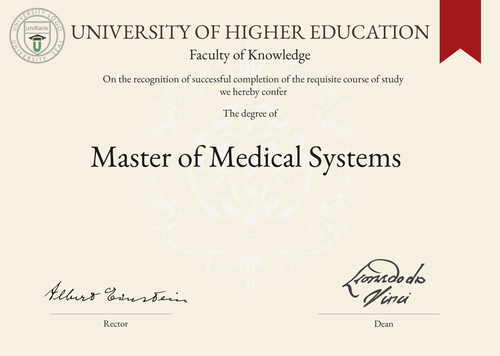
Master of Medical Systems (MMS)
Guide to Master of Medical Systems Program/Course/Degree
Master of Medical Systems (MMS)

Program Name:
Master of Medical SystemsProgram or Degree abbreviation:
MMSDuration range:
The duration of the Master of Medical Systems program can vary depending on the country or university. Typically, it ranges from 1 to 2 years.Tuition range:
The tuition fees for the Master of Medical Systems program can vary based on the country or university. The range can vary from affordable to expensive, depending on the location and reputation of the institution.Overview:
The Master of Medical Systems program is designed to provide students with a comprehensive understanding of medical systems and their applications in healthcare. It focuses on the integration of technology, data analysis and management principles to improve healthcare delivery and patient outcomes.Curriculum Overview by year:
The curriculum of the Master of Medical Systems program is structured to cover various aspects of medical systems. The coursework typically includes subjects such as healthcare technology, healthcare informatics, healthcare management, data analysis and research methods. Students may also have the opportunity to engage in practical training or research projects.Key Components:
The key components of the Master of Medical Systems program include: - Understanding medical systems and their applications in healthcare - Integration of technology and data analysis in healthcare delivery - Healthcare informatics and management principles - Practical training or research projectsCareer Prospects:
Graduates of the Master of Medical Systems program can pursue various career paths in the healthcare industry. They may find employment opportunities in hospitals, healthcare technology companies, research institutions, government agencies, or consulting firms. Possible job roles include healthcare systems analyst, healthcare project manager, healthcare informatics specialist, or healthcare consultant.Salary Expectations:
The salary expectations for individuals with a Master of Medical Systems degree can vary depending on factors such as the country, job role and level of experience. Generally, professionals in this field can expect competitive salaries, with potential for growth as they gain more experience and expertise. For a more accurate understanding of salary expectations, you can utilize the Job Sites Search Engine, from our sister site jobRank, which searches over 4,600 job sites worldwide. Make sure to specify not only the job title but also the country you are interested in.Conclusions:
It is important to note that the duration, tuition fees, curriculum, key components, career prospects and salary expectations of the Master of Medical Systems program can vary based on the chosen country or location of study, as well as the chosen university. Prospective students are advised to research and compare different programs and institutions to find the best fit for their academic and career goals. Visitors interested in pursuing a Master of Medical Systems degree can search for programs offered worldwide through the uniRank World Universities Search Engine. This search engine provides a comprehensive database of universities and their programs, allowing individuals to explore options and make informed decisions about their education.World Universities Search Engine
search for Master of Medical Systems (MMS) and add the Location (country, state etc.) or specific University you are interested in studying at.
Query examples:
- Master of Medical Systems (MMS) United States
- Master of Medical Systems (MMS) United Kingdom online
- Master of Medical Systems (MMS) Australia international students
- Master of Medical Systems (MMS) University of California
- Master of Medical Systems (MMS) University of London tuition fees
- Master of Medical Systems (MMS) University of Sydney scholarships
Share Program/Course
Interesting? Share this program/course/degree info with your friends now.